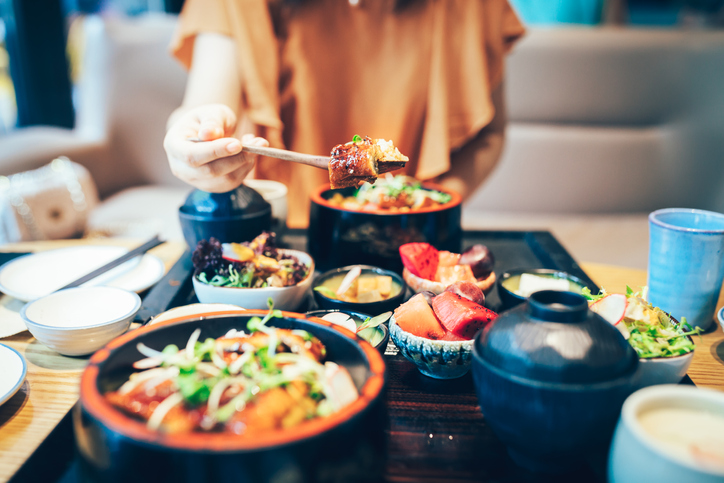The secret to a long and healthy life might just be hidden in a traditional Japanese diet. Japanese cuisine has long been lauded for its health benefits. Rich in fresh and unprocessed food, it steers clear of refined foods and sugar. It comes as no surprise, therefore, that the country is home to a very high number of relatively healthy centenarians. The risk of age-related diseases is also significantly low, and this has also been attributed to the enriching aspects of Japanese cuisine. Research by the British Medical Journal found that individuals who followed the guidelines of a Japanese diet were less likely to die from heart disease or stroke.
Also read: 16 Japanese dishes (that aren’t ramen) that you must not miss
What Does A Traditional Japanese Diet Comprise?
The traditional Japanese diet is high in soy and fish (which has played a significant role in reducing risk of cardiovascular disease). In fact, traditional Chinese and Japanese cuisine are rather similar. Like Chinese food, Japanese food consists of rice, cooked and pickled vegetables, and lots of fish and meat. Japan consumes more fish than most Asian countries. Aside from cooked fish, raw fish in the form of sushi and sashimi is extremely popular. Sushi and sashimi have an abundance of omega-3, a fatty acid that is very important for our health.

Tofu and soya beans are also a huge part of Japanese cuisine along with aduki, another type of bean. Aduki is known to aid in digestion and reduce the rate of heart disease. Tofu is an excellent source of protein, iron, and calcium and contains nine essential amino acids. Soya beans are high in fibre and protein and are a great source of antioxidants. Fermented foods are extremely beneficial to our digestive systems, which is why fermented soybean products like miso and natto are intrinsic to the Japanese diet. People in Japan also consume many types of land and sea vegetables such as seaweed. Seaweed comprises several health-boosting minerals that lower blood pressure.
For dessert, the Japanese enjoy fruits such as Fuji apples, tangerines, and persimmons. Apples are known to be high in fibre and low in calories. Tangerines are a source of vitamins A and C as well as iron, potassium, folate, fiber, and flavonoids. Persimmons help in digestion and are good for people with hypertension. When it comes to beverages, green tea, especially matcha tea is incredibly popular. Matcha is essentially stone-ground powdered green tea that contains high antioxidant compounds known as catechins. Catechins have been associated with fighting cancer, viruses, and heart disease.
Why Is Japanese Cuisine So Healthy?
While individual food items in Japanese cuisine have their distinct benefits, a major part of why Japanese food is so healthy is because of the way it is consumed. The Japanese are extremely particular about the amount of food they consume at a given time, always ensuring moderation. Eating small quantities of food throughout the day prevents them from overeating and promotes a balanced diet. Variety is the highlight of a Japanese diet. On a typical day, the Japanese make it a point to consume about 15 to 20 types of food. Japanese food culture promotes this variety as it creates more space to accommodate a healthy, balanced diet. The more variety there is, the better the chances of someone consuming all the essential nutrients.

Another important aspect of Japanese food culture is the manner in which food is served. Instead of one large plate (what most of us are used to), the Japanese eat from multiple small bowls that have limited portions. Several different dishes which include a bowl of rice, a bowl of miso, some fish or meat, and two or three vegetable dishes are served communally and consumed in rotation. The Japanese believe in ‘flexible restraint’ when it comes to snacks. Instead of completely eliminating snacks from their diet, they enjoy it from time to time in small portions. This allows individuals to maintain their ideal weight.
Japanese dishes don’t just lead to overall well-being, they also contribute to healthy, glowing skin. Seaweed helps prevent acne and the swelling it comes with. Its anti-inflammatory properties act as natural exfoliants for your skin. Since green tea helps with detoxification, it naturally makes your skin glow. Tofu promotes an even skin tone because of its high vitamin E content that helps reduce discolouration, dark spots, wrinkles, and even fine lines.
Adopting The Japanese Style Of Eating Might Serve Us Well In The Long Run
The Japanese style of eating is rich in nutrients and beneficial compounds that will help maintain a healthy weight and protect against chronic diseases. Improved digestion because of a clean, healthy diet will promote overall well-being. While we may not be able to incorporate every aspect of Japanese food into our diets, we can always try our best to do away with refined foods and sugars and eat more boiled dishes. Over time, such a shift in our diets will positively affect our lifestyles and may actually extend our lifespan.
Also Read: Taste The World With These 12 Delicious Vegan Recipes


